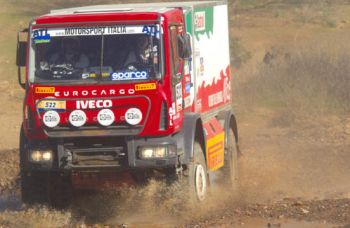|
With former rally
stars Markku Alén and Miki Biasion at the wheel, Italian
truck manufacturer Iveco, will be bidding for outright
victory on the 2006 Lisboa-Dakar Rally with the huge and
powerful 13-litre Trakker 190T44 truck when the team
takes to the start ramp tomorrow morning in Lisbon,
Portugal.
This year's 28th edition of the famous cross-desert race to
Dakar will be Iveco's second official participation. Last
year, with the smaller Eurocargo 140E24 4X4 truck, and with
Alén and Biasion both on the driving strength, the former
finished the event in a highly impressive seventh place,
although it was one of the few leading truck entries to
boast an engine of less than 10-litres. For the 2006 edition
Iveco have developed the 13-litre Trakker 190T44W in a bid
to claim overall race honours, while a pair of the smaller
Eurocargo 140E24 trucks complete an ambitious five-vehicle
entry, which will once again be run by Motorsport Italia Srl.
Alen and Biasion will be joined in the team by experienced
Spanish veteran Josep Vila Roca.
The 28th
edition of the race, will start from Lisbon tomorrow
morning, and race across the North African desert before
arriving on Dakar on 15th January 2006. The rally, which saw
the entry list close in July in all categories, will set off
for the first time from Portugal, with 508 teams in the
race, made up of 240 motorbikes, 188 cars and 80 trucks,
along with 240 assistance vehicles.
After two new style specials
which will be contested on European soil, and the
competitors timed over
approximately 200 kilometres, the caravan of motorcycles,
cars and trucks will arrive in Africa where they will cross Morocco, Mauritania (a rest day
will occur in Nouakchott), Mali, Guinea and Senegal, with the finish of
the race being judged on the banks of Lac Rose. During this
long trip, a total of 9,043 km including almost 5,000 km of
special stages, the emphasis will be on a return to
navigating, the founding principle of rally raids. GPS
functions are being deliberately reduced this year, obliging
drivers and co-drivers to navigate exclusively according to
information given in the road-book. Moreover, several
measures, such as fixing a speed limit (160 km/h) and
reducing autonomy for bikes, have been adopted with a view
to improving safety conditions for competitors and local
populations. |
|
 |
|
Last year, with the small Eurocargo 140E24 4X4
trucks, and with Alén and Biasion on the driving
strength, the former finished in a highly impressive
seventh place, although it was one of the few
leading truck entries to boast an engine of less
than 10-litres |
|
|
In the truck
category Kamaz,
who have dominated the competition with multiple Dakar
winner Vladimir Tchaguine (who lines up this year in Kamaz
truck No 508) and last year's winner Firdaus Kabirov (No
500) will see their dominace challenged this year by DAF,
Tatra, Mercedes, Hino and Iveco. A
question mark remains concerning the Dutch DAF team who
still aren’t yet sure of being able to start the rally
tomorrow after having failed to pass yesterday's
scruitineering. They need the FIA to send them the correct
license to allow them to start the event. The clock is
ticking down for the big blue trucks entered by the De Rooy
family, and only tomorrow morning will tell if they can hope
to head to Portimao on New Year’s Eve for stage 1 of the
Dakar Rally.
|
|
|
|
![]()
![]()